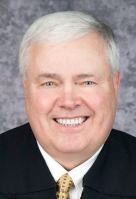Wyatt: When Less Is More
Tuesday, August 14, 2018 | 0
Just as doctors rarely have professional relationships with healthy people, judges don’t often see cases where the workers’ compensation system works.

Judge Thomas Wyatt
From the judicial vantage point, I see the stakeholders in the workers’ compensation system — injured employees, employers, carriers, medical providers and their attorneys — as prone to adversarial thinking in assessing their respective interests. In the process, conflict often consumes monetary assets and good will.
However, conflict doesn’t have to be an element of the system. I recently approved a settlement in a claim where everyone acted reasonably, diligently and, I might even say — valiantly — to the benefit of all parties.
I bring this inspiring story to your attention as an object lesson that less (conflict) is more (beneficial).
On Aug. 4, 2017, 26-year-old Dustin Gardner was in his third year as a “sixth hand,” a machine operator, at Chattanooga’s Westrock Industries, a manufacturer of uncoated boxboard. His father’s 30-plus-year employment at Westrock convinced Dustin that he, too, would value the opportunity to build a career at the plant.
On landing his job, Dustin, like most Westrock employees, expected to work there until “retirement or death.”
Westrock’s general manager, Pat Cowan, recognized Dustin’s assets as an employee from the beginning. He observed that Dustin exhibited “ownership” of not only his job but also of how his job coordinated with co-employees’ jobs for the efficient completion of the plant’s manufacturing process. Cowan noted Dustin's his willingness to exert extra effort not only to complete his job but also to assist his coworkers. Dustin had a bright future at Westrock.
Then life happened. Dustin reached his gloved, non-dominant, left hand into a machine to assist its operation. The machine grabbed the glove and, in an instant, ripped it and Dustin’s thumb off. His hand was so catastrophically injured that surgeon Dr. Marshall Jemison had to remove the fingers of his left hand, and one of the knuckles.
In the weeks that followed, nobody would’ve given very good odds on Dustin even returning to Westrock, let alone to completing a career there. However, the oddsmakers didn’t know Dustin or the management team at Westrock.
Cognizant of Dustin’s value as an employee, Cowan, John Barlew (Westrock’s safety manager) and other management officials didn’t confine their thinking to the obvious obstacles to his return as a sixth hand. Instead, they assessed opportunities within the plant that could accommodate Dustin’s return to work. They determined that the plant would benefit from an inventory technician to organize the machine parts and equipment that Westrock keeps onsite, and brought Dustin back to staff this position.
Management also saw that Dustin’s story would be a powerful asset to the company’s safety program. They provided him safety training and broadened his duties to include those of a safety advocate.
In addition to his own inspiring efforts and management’s progressive approach, case manager Camille Terranova played a huge role in providing Dustin the medical assistance he needed. She encouraged him to become personally involved in his recovery. Further, with the assistance and support of his wife, Jessica, a nurse, Dustin researched the available technology in hand prostheses.
His research recovered a device manufactured by Touch Bionics that resembles a plastic hand with a workable thumb and fingers. Less expensive devices were available, but Westrock and its carrier formulated a budget that enabled Dustin to receive the prosthesis he chose for himself.
Dustin’s progress in using the prosthesis is nothing short of miraculous. The device allows him to manipulate its fingers and thumb with his own electronic brain impulses. Dustin stated that he can’t play the piano, but, within limits, can perform most other functions he could with his anatomical, non-dominant hand. He credits prostheticist Jeff Roberts at Durr-Fillauer in Chattanooga with expertly fitting him with the device and training him to use it.
I interviewed Dustin and Barlew separately. They both credited trust as a central factor of their story. Dustin said he trusted that if he “gave 100%” in exerting a positive attitude and commitment to his recovery, Westrock would “take 100%” of the steps necessary to help him succeed. Barlew cited his trust in Dustin’s commitment to recovering in personally deciding to mentor him in the direction of an opportunity within Westrock’s safety organization.
In sum, the workers’ compensation system operated the way it should in Dustin’s case. Medical providers expertly treated him. A case manager and attorneys for the parties advocated for their principals’ best interests without upsetting the trust between Dustin and Westrock’s management. And decision-makers committed financial assets to his medical and industrial recovery that didn’t focus on the monetary bottom line but on an investment in a valued employee.
The poet Maya Angelou wrote, “I can be changed by what happens to me. But I refuse to be reduced by it.” Dustin and his colleagues at Westrock are changed today by what happened to him almost a year ago. But, out of the ashes, much good has resulted. It’s rewarding and inspiring to see the workers’ compensation system helped, instead of hindered, along the way.
Thomas Wyatt is a judge in the Tennessee Court of Workers' Compensation Claims, Chattanooga. This entry is republished with permission from the court's blog.







Comments